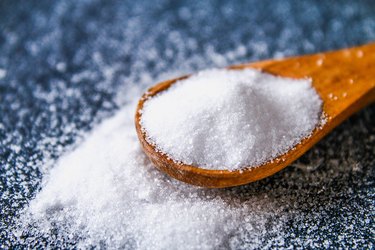
A common criticism of prepackaged meals is that they contain too much sodium, which intimidates consumers who want to prevent sodium weight gain. Canned soups and frozen protein bowls are suddenly less appealing, while products proclaiming "reduced-sodium" attract health-conscious customers.
The majority of Americans are consuming more salt than recommended in the form of restaurant, prepackaged or processed foods. It's unclear if the link between salt and obesity is due to salt itself or to the overconsumption of commercially prepared food. But Americans remain concerned with salt's connection to water-weight gain and with whether reduced salt intake aids weight loss.
Video of the Day
Video of the Day
Tip
High salt intake can cause temporary water-weight gain because salt is an electrolyte that encourages fluid retention. Sodium weight gain is usually insignificant and temporary.
Daily Sodium Recommendations
Though salt and sodium are used interchangeably, they're not the same. Sodium is a mineral, and salt is one of the biggest dietary sources of that mineral. Sodium also functions as an electrolyte that helps regulate the body's fluid balance.
Dietary Guidelines for Americans recommends that adults consume up to 2,300 milligrams of sodium per day. The American Heart Association recommends even less sodium with an ideal intake of 1,500 milligrams per day. However, the current average intakes are 4,240 milligrams for men daily and 2,980 milligrams for women.
According to the Centers for Disease Control and Prevention, consuming too much salt is associated with high blood pressure and increased risk of cardiovascular conditions. The majority of dietary salt doesn't come from home cooking, however. An estimated 70 percent of Americans' sodium consumption comes from restaurants, prepackaged and processed foods.
Read more: What Do Salt & Sugar Do to Your Body?
Sodium Weight Gain
There are proven links between high sodium intake and poor health, but are the sodium weight-gain rumors true?
An October 2015 study published in Hypertension aimed to determine whether there was a direct link between salt intake and obesity. Researchers found that high salt intake may be a potential risk factor for obesity, but the link is still unclear. The study also suggests that there may be a correlation between reduced salt intake and weight loss.
The existing research on sodium weight gain doesn't account for other factors, such as calorie intake and activity level.
Read more: 10 Myths About Salt Debunked
Salt Affects Water-Weight Gain
If the scale goes up after consuming copious amounts of salty food, it may not be true weight gain. Sodium is notorious for encouraging the body to hold onto liquids. This is known as water retention, and it's why people associate salt with water-weight gain.
An April 2017 study published in the Journal of Clinical Investigation confirmed that increased salt intake leads to water retention. A surprising finding of the study is that high salt intake causes decreased thirst and increased appetite. Though participants drank fewer liquids, researchers found that the increased sodium led to a water surplus in the body, increased body weight and increased hunger.
Read more: How to Shed Water Weight
Salt Intake and Weight Loss
Sodium weight gain likely isn't due to salt itself but to the consumption of high-fat, processed foods that are usually salty. High salt intake is also associated with decreased thirst and water retention, which can be confused with weight gain. Since sodium affects the appetite, overeating may lead to weight gain.
While the link between salt and weight gain is still unclear, many health organizations suggest that Americans reduce the amount of sodium they consume by a significant amount. They recommend making fresh food at home, which is naturally lower in sodium, rather than eating restaurant food or processed food.
If you monitor your salt intake, weight loss may occur from choosing fresh food, curbing your appetite and decreasing water weight.
- Dietary Guidelines for Americans: “Appendix 7. Nutritional Goals for Age-Sex Groups Based on Dietary Reference Intakes and Dietary Guidelines Recommendations”
- American Heart Association: “How Much Sodium Should I Eat Per Day?”
- Centers for Disease Control and Prevention: “The Role of Sodium in Your Food”
- Hypertension: “High Salt Intake: Independent Risk Factor for Obesity?”
- The Journal of Clinical Investigation: “Increased Salt Consumption Induces Body Water Conservation and Decreases Fluid Intake”
- European Journal of Physiology: "The Biopsychology of Salt Hunger and Sodium Deficiency"